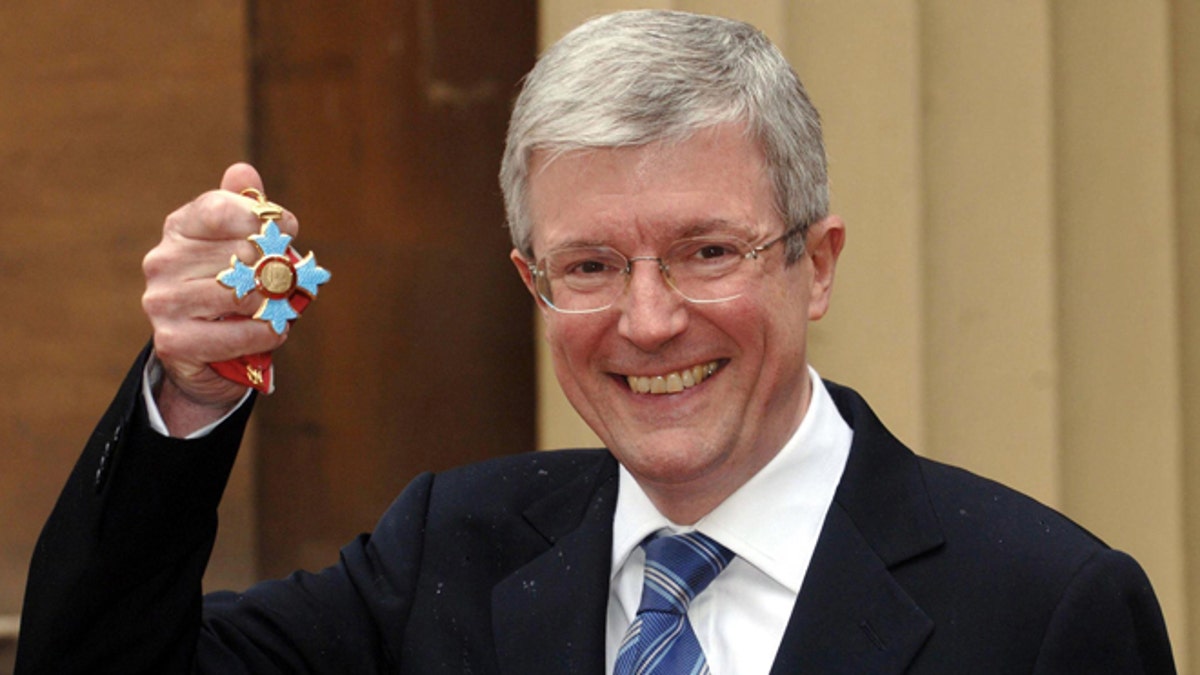
FILE - In this file photo dated May 24, 2006, Tony Hall, chief executive of the Royal Opera House in London receives a CBE. Tony Hall, currently chief executive of the Royal Opera House, was announced as the BBC's new director-general on Thursday Nov. 22, 2012. (AP)
LONDON – The BBC appointed a new director-general on Thursday, moving quickly to fill the top post following the resignation of its previous leader amid a damaging pedophilia scandal.
Tony Hall, a longtime former BBC insider and former director of news, who is currently the chief executive of the Royal Opera House, will step into the high-profile role.
“The past eight weeks have been very traumatic for the BBC," Chris Patten, the former Hong Kong governor and current chairman of the BBC Trust, which oversees the broadcaster, said in statement to staff.
Lord Patten said this was “a significant day for the BBC," that "marks the beginning of a new phase.”
"The key challenge will be re-establishing our reputation with the public. I hope you will all support Tony Hall as he goes about the important work of doing just that," he told staff.
The previous director-general, George Entwistle, lasted just eight weeks in the job before resigning over the BBC’s incorrect slurring of a former Conservative politician as a child abuser. Entwistle took the role from Mark Thompson, who recently became executive of The New York Times Company.
The BBC’s flagship evening current affairs show, "Newsnight," earlier this month incorrectly linked Lord McAlpine, a former treasurer of the Conservative Party, with a sexual abuse scandal at a children’s home in Wrexham, north Wales, in the 1980s.
While McAlpine was not named, the blanks were quickly filled in online and on social media, prompting the former adviser to Prime Minister Margaret Thatcher to publicly deny the allegations.
The program was forced to apologize for the report, after it emerged that McAlpine was wrongly identified and was not contacted prior to the report's airing.
The BBC said it would pay McAlpine about $293,000, plus legal costs, in a settlement.
Entwistle was forced to resign after a humiliating round of interviews that cast severe doubt on his ability to control the vast organization. The interim director-general, Tim Davie, had vowed to “get a grip” on the situation, but he compounded the sense of crisis at the BBC when he bizarrely stormed off in his first live interview on Sky News.
McAlpine spoke movingly of his dismay at the BBC’s shoddy journalism and the horror of being wrongly labeled a child abuser.
"Of course they should have called me and I would have told them exactly what they learned later on,” McAlpine, who is 70, told BBC Radio.
He described the report as “complete rubbish,” adding, “they could have saved themselves a lot of agonizing and money, actually, if they'd just made that telephone call."
"It gets into your bones. It gets into, it makes you angry. And that's extremely bad for you to be angry. And it gets into your soul and you just think there's something wrong with the world,” he said.
The scandal has plunged the 90-year-old broadcaster into crisis, raising questions over its journalistic and management standards.
The crisis centers on two failures by "Newsnight" on stories related to child abuse. In the first case, the show chose not to broadcast allegations of child abuse about the late BBC TV presenter Jimmy Savile. The reports were later broadcast by another network.
The posthumous allegations prompted a wave of other victims to come forward and highlighted a culture of sexual exploitation by some stars at the BBC, particularly during the 1970s.
So far four people have been arrested in connection with the Savile abuse, including well-known personalities from the British entertainment industry.
"Newsnight" compounded the error by incorrectly linking McAlpine to child abuse. The report caused a national furor, with at one point Prime Minister David Cameron even being ambushed with a list of suspected pedophile politicians live on TV.
Lord Patten has come under heavy pressure for approving a full-year payout for Entwistle, despite him lasting just eight weeks in the job.
The BBC is funded by the “license fee,” essentially a tax on households that own televisions.
